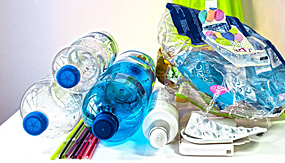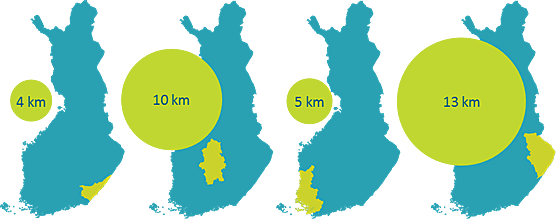
© Pixaby
Finns are concerned about the problems caused by plastic waste and consider the recycling of plastic to be important. However, recycling is also considered difficult, as plastic collection points are located far away from homes.
YLE commissioned Taloustutkimus to carry out a survey on the willingness of Finns to sort their waste and the factors affecting it. The results of the survey were published in early 2019. The results indicate that the majority of respondents are concerned about the environmental problems associated with plastic waste. However, only 63% of respondents reported sorting their plastic packaging waste. In contrast, 96% of respondents reported sorting paper. It should be noted, however, that respondents of the online survey may consist of people with a significant interest in sorting waste.
The most notable reasons for not sorting had to do with the closeness of separate collection points. 28% of respondents reported not sorting because their nearest waste collection point was too far away. Additionally, 40% of respondents reported not sorting because their own housing company lacked a suitable waste collection container. Other reasons reported for not sorting included lack of space in the kitchen (32%) and the difficulty of sorting (24%). 74% of respondents were of the opinion that having a collection container closer to their home would motivate them to sort.
In other words, Finns consider the sorting of plastic to be important, but collection containers seem to be too far away.
Distances to plastic collection points vary in different parts of Finland
The Finnish Environment Institute SYKE decided to look into how far away from regional plastic packaging collection points people live on average in different parts of Finland. The study included four regions: South and North Karelia, Central Finland and Southwest Finland (including Satakunta). The calculations are based on the locations of RINKI eco take-back points only and do not include any plastic packaging collection points managed by waste facilities, municipalities or property owners.

A resident’s average distance to a regional plastic collection point in kilometres in South Karelia, Central Finland, Southwest Finland (including Satakunta) and North Karelia. © SYKE
According to the study, distances to regional plastic collection points vary considerably between regions. In South Karelia and Southwest Finland, a resident’s average distance to a regional collection point was under five kilometres in 2018. Conversely, in sparsely populated Central Finland and North Karelia, the average distances were over 10 kilometres. In Southwest Finland, 62% of residents lived within three kilometres of a regional plastic packaging waste collection point. In North Karelia, only 40% of the population lived within the same distance.
According to Suomen Pakkauskierrätys RINKI Ltd, which manages the collection of plastic packaging waste with RINKI eco take-back points, the most popular RINKI eco take-back point in 2018 was located at the Prisma hypermarket in Joensuu. Residents may be compensating for the long distances to collection points in North Karelia by dropping off plastic packaging to be recycled in connection with grocery shopping trips.
Is the possibility of sorting an indicator of well-being?
Based on the results of the survey, it seems clear that people would like to have plastic packaging collection points closer to their homes. The situation is better in some areas than in others. The open comments published from the YLE survey indicate that lack of sorting possibilities is a source of frustration for people.
Perhaps we could go as far as to say that nowadays waste sorting is everyone’s right, regardless of where you live? Finns clearly consider waste sorting to be important and see it as a small everyday action that changes the world for the better. As such, could the proximity of a waste sorting point make people happier?
This and other social impacts of the circular economy are currently being studied in the CIRCWASTE – Finland Towards Circular Economy project.